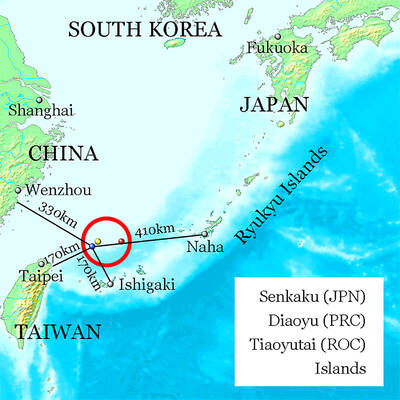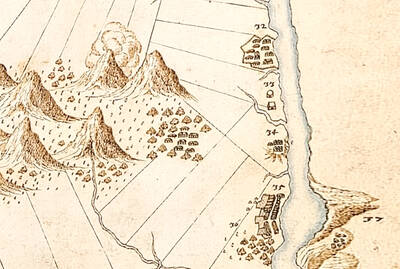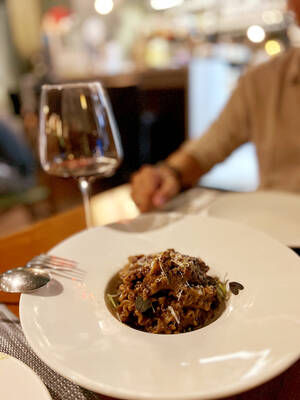Fresh from being crowned the “king” of the Mando-pop charts, Jay Chou (周杰倫) was unceremoniously usurped last week by Mayday (五月天). The pretty-boy rockers announced that sales of their latest release Poetry of the Day After (後青春期的詩) totaled over 1.3 million copies, and noted that they edged past the Chairman’s Capricorn (魔杰座), which just broke the 1 million mark.
Chou’s record company JVR Music (杰威爾音樂) took the announcement as a dig. Instead of congratulating the competition, the company issued a long-winded, huffy response that ended with, “there’s no need to brag,” reports the Liberty Times [the Taipei Times’ sister paper].
The hoopla left Mayday’s lead singer, A-hsin (阿信), exasperated. “[Chou] is using Rubik’s Cubes [to sell records], we’re doing concerts — it’s a lot more tiring,” said A-hsin, referring to the Rubik’s Cubes plastered with Chou’s face that are being offered as a freebie with his new album. But he quickly composed himself. “Whoever’s number one is not important. The most important thing is for everyone to have good sales.” That is, just as long as Jay isn’t number one ...
Only the Apple Daily can turn a pop idol’s mundane shopping trip into a lost-love-drove-her-to-drink-narrative. One of the paper’s ace reporters spotted Elva Hsiao (蕭亞軒) at the Breeze Center’s (微風廣場) supermarket, where the 28-year-old singer was looking for a bottle of wine. Since Hsiao appeared “melancholic” and was lingering in the alcohol section, she obviously intended to drown her sorrows over male heartthrob model Leandro (李安卓), who got “snatched” out of her arms by model Liu Zhen (劉真).
Hsiao’s agent insists that Leandro is “just a friend” and Hsiao has plenty of prospective beaus lined up at the door — she just “hasn’t made her decision” yet. As for the wine, Hsiao and her mother regularly enjoy a nightcap. And who doesn’t? The photos accompanying the Apple Daily article are worthy of mention for the play-by-play captions that would make any stalker proud.
8:43pm: The store manager shows Hsiao a bottle of wine. 8:45pm: Hsiao is pictured with her brother, and she’s using a credit card to buy a bottle of red wine, which costs NT$2,100. 8:52pm: She’s in the Fendi store. She’s been looking at bags for what seems like an eternity. But in the end, she didn’t buy one.
German film director Wim Wenders was seen wandering the streets of Taipei earlier this week, on a visit with young filmmaker Arvin Chen (陳駿霖) [see Highlight on Page 15]; The director of Paris, Texas and Buena Vista Social Club is serving as executive producer for Chen’s upcoming film First Page Taipei (一頁台北). The Liberty Times reports that Wenders’ hosts took him to the Shida night market (師大夜市), where they frequently lost sight of the auteur, only to find him photographing scenes that caught his eye: a hardware store; an NT$10 discount store; and elderly shopkeepers.
A night market is an unlikely place to spot Japanese singer Ayumi Hamasaki, who performs tomorrow and Sunday at Taipei Arena. But if the demanding pop diva makes any public appearances, her assistants will have to be ready for anything — and that could mean having a toilet brush at hand.
A China Times article earlier this month relayed this past tale: on an outdoor photo shoot, Hamasaki told a male assistant she had to go to the bathroom. His immediate response was to find the nearest public toilet, scrub it clean, and make sure the coast was clear so the pop princess could have the facilities to herself.

Last week gave us the droll little comedy of People’s Republic of China’s (PRC) consul general in Osaka posting a threat on X in response to Japanese Prime Minister Sanae Takaichi saying to the Diet that a Chinese attack on Taiwan may be an “existential threat” to Japan. That would allow Japanese Self Defence Forces to respond militarily. The PRC representative then said that if a “filthy neck sticks itself in uninvited, we will cut it off without a moment’s hesitation. Are you prepared for that?” This was widely, and probably deliberately, construed as a threat to behead Takaichi, though it

Nov. 17 to Nov. 23 When Kanori Ino surveyed Taipei’s Indigenous settlements in 1896, he found a culture that was fading. Although there was still a “clear line of distinction” between the Ketagalan people and the neighboring Han settlers that had been arriving over the previous 200 years, the former had largely adopted the customs and language of the latter. “Fortunately, some elders still remember their past customs and language. But if we do not hurry and record them now, future researchers will have nothing left but to weep amid the ruins of Indigenous settlements,” he wrote in the Journal of

Even after years in business, weekend tables here can be booked out a month in advance. The price point far exceeds its competitors. Granted, expectations are soaringly high, but something here failed to hit the high notes. There are a few telltale signs that a restaurant relies solely on outstanding food to create the experience, no gimmicks or distractions needed. La Mole is such a restaurant. The atmosphere is food-forward, with an open kitchen center stage. Our tables are simple; no candles, no dim lighting, no ambient music. The menu is brief, and our waiter directs most

If China attacks, will Taiwanese be willing to fight? Analysts of certain types obsess over questions like this, especially military analysts and those with an ax to grind as to whether Taiwan is worth defending, or should be cut loose to appease Beijing. Fellow columnist Michael Turton in “Notes from Central Taiwan: Willing to fight for the homeland” (Nov. 6, page 12) provides a superb analysis of this topic, how it is used and manipulated to political ends and what the underlying data shows. The problem is that most analysis is centered around polling data, which as Turton observes, “many of these